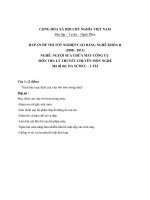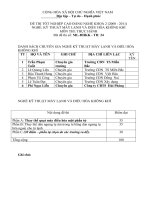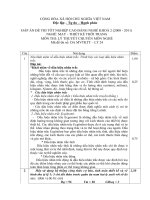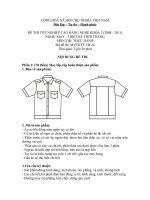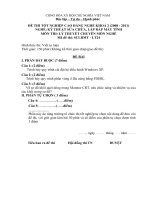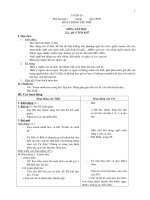PASSAGE 24
Bạn đang xem bản rút gọn của tài liệu. Xem và tải ngay bản đầy đủ của tài liệu tại đây (41.9 KB, 4 trang )
PASSAGE 24
It was once believed that being overweight was healthy, but nowadays few people subscribe to this
viewpoint. While many people are fighting the battle to reduce weight, studies are being conducted
concerning the appetite and how it is controlled by both emotional and biochemical factor. Some of the
conclusions of these studies may give insight into how to deal with weight problems. For example, when
several hundred people were asked about their eating habits in times of stress, 44 percent said they
reacted to stressful situations by eating. Further investigations with both humans and animals indicated
that it is not food which relieves tension but rather the act of chewing.
A test in which subjects were blindfolded showed that obese people have a keener sense of taste and crave
more flavorful food than non-obese people. When derived of the variety and intensity of tastes, obese
people are not satisfied and consequently eat more to fulfill this need. Blood samples taken from people
after they were shown a picture of food revealed that overweight people reacted with an increase in blood
insulin, a chemical associated with appetite. This did not happen with average-weight people.
In another experiment, results showed that certain people have a specific, biologically induced hunger for
carbohydrates. Eating carbohydrates raises the level of serotonin, a neurotransmitter in the brain. Enough
serotonin produces a sense of satiation, and hunger for carbohydrates subsides.
Exercise has been recommended as an important part of a weight-loss program. However, it has been
found that mind exercise, such as using stairs instead of the elevator, is better in the long run than talking
on a strenuous program, such as jogging, which many people find difficult to continue over periods of
time and which also increase appetite.
Question 1. What is the main purpose of the passage?
A. To discuss the healthy problems caused by being overweight
B. To recommend a weigh-loss program for the obese
C. To help overweight people overcome their eating problem
D. To present research into the factors causing obesity
Question 2. The author mentions people’s eating habits during times of stress to show that ______.
A. overweight people are tense
B. thin people don’t eat when under stress
C. a large percentage of people deal with stress by eating
D. 56 percent of the population isn’t overweight
Question 3. The word ‘crave’ in paragraph 2 is closest in meaning to ______.
A. devour
B. absorb
C. sewn
D. desire
Question 4. The passage supports which of the following conclusions?
A. Thin people don’t enjoy food.
B. A variety of foods and strong flavors satisfies heavy people.
C. Overweight people have an abnormal sense of taste.
D. Deprivation of food makes people fat.
Question 5. According to the passage ______.
A. insulin increases in the bloodstream when people eat large amounts of foo
used to lessen the appetite
D. B. insulin can be
Page 1
C. insulin causes a chemical reaction when food is seen
D. insulin levels don’t change in average-weight people who see food
Question 6. The word ‘this’ in paragraph 2 refers to ______.
A. a reaction to a chemical
B. an increase in appetite
C. a revealing blood sample
D. an increase in blood insulin
Question 7. The word ‘subsides’ paragraph 3 is closest in meaning to ______.
A. declines
B. multiplies
C. conquers
D. suppresses
Question 8. What can be said about serotonin?
A. It is a chemical which increases appetite.
B. Only certain people produce it in their brains
C. It tells the brain when a person is full.
D. It neurotransmitters carbohydrates to the brain.
Question 9. The author suggests that it might be good for people wanting to lose weight to do all of the
following EXCEPT ______.
A. jog 3 miles daily and look at pictures of food
B. walk up stairs and chew on carrot sticks
C. eat plenty of chewy carbohydrates
D. avoid stressful situations and eat spicy foods.
Question 10. Which one of the following exercises might be best for an overweight person to engage in
daily?
A. An evening walk
B. A long swim
C. Cross-country skiing
D. 10-mile bicycle rides
Page 2
ĐÁP ÁN
1-D
2-C
3-D
4-B
5-D
6-D
7-A
8-C
9-A
10A
LỜI GIẢI CHI TIẾT
Question 1:
to present research into the factors causing obesity = trình bày khảo sát về các tác nhân gây ra sự béo phì
Question 2:
a large percentage of people deal with stress by eating
Thông tin ở đoạn sau: “For example, when several hundred people were asked about their eating habits in
times of stress, 44 percent said they reacted to stressful situations by eating.” (Ví dụ như, khi hàng trăm
người được hỏi về thói quen ăn uống của họ lúc bị căng thẳng, 44 phần trăm nói rằng họ đã phản ứng lại
với các trạng thái căng thẳng bằng việc ăn.)
Question 3:
desire = thích thú
Question 4:
a variety of foods and strong flavors satisfied heavy people
Thông tin ở đoạn sau: “A test in which subjects were blindfolded showed that obese people have a keener
sense of taste and crave more flavorful food than non-obese people.” (một cuộc kiểm tra mà chủ thể đã bị
bịt mắt cho thấy rằng những người béo phì thích mùi vị và thích thú với đồ ăn nhiều vị hơn những người
khơng béo phì.”
Question 5:
insulin levels don’t change in average-weight people who see food
Thông tin ở đoạn sau: “Blood samples taken from people after they were shown a picture of food revealed
that overweight people reacted with an increase in blood insulin, a chemical associated with appetite. This
did not happen with average-weight people.” (Các mẫu máu lấy từ những người sau khi họ được cho xem
một bức tranh về đồ ăn cho thấy những người thừa cân phản ứng với lượn insulin trong máu cao, một loại
hóa chất liên quan đến sự them ăn.)
Question 6:
an increase in blood insulin
Thông tin ở đoạn sau: “Blood samples taken from people after they were shown a picture of food revealed
that overweight people reacted with an increase in blood insulin, a chemical associated with appetite. This
did not happen with average-weight people.” (Các mẫu máu lấy từ những người sau khi họ được cho xem
một bức tranh về đồ ăn cho thấy những người thừa cân phản ứng với lượn insulin trong máu cao, một loại
hóa chất liên quan đến sự them ăn.điều này khơng xảy ra với những người có cân nặng trung bình.)
Question 7:
declines = suy giảm
Question 8:
it tells the brain when a person is full
Page 3
Thông tin ở đoạn sau: “In another experiment, results showed that certain people have a specific,
biologically induced hunger for carbohydrates. Eating carbohydrates raises the level of serotonin, a
neurotransmitter in the brain. Enough serotonin produces a sense of satiation, and hunger for
carbohydrates subsides.” (Trong một thí nghiệm khác,các kết quả cho thấy rằng một số người nhất định
có cảm giác đói thôi thúc với carbonhydrate. Việc ăn carbonhydrate làm tăng mức độ serotonin, một chất
dẫn truyền thần kinh trong não. Lượng vừa đủ serotonin tạo nên cảm giác thỏa mãn và giảm cảm giác đói
carbonhydrate
Question 9:
jog 3 miles daily and look at pictures of food
Thông tin ở đoạn sau: “Exercise has been recommended as an important part of a weight-loss program.
However, it has been found that mind exercise, such as using stairs instead of the elevator, is better in the
long run than talking on a strenuous program, such as jogging, which many people find difficult to
continue over periods of time and which also increase appetite.” (tập thể dục là một phần quan trọng của
chương trình giảm cân. Tuy nhiên người ta nhận thấy rằng các bài tập tinh thần ví dụ như sử dụng bậc
thang thay vì thang máy tốt hơn việc nói về một chương trình vất vả như đi bộ, điều mà nhiều người cảm
thấy khó duy trì trong một thời gian và còn làm tăng cảm giác them ăn.)
Question 10:
an evening walk = một buổi chiều đi dạo
Page 4
